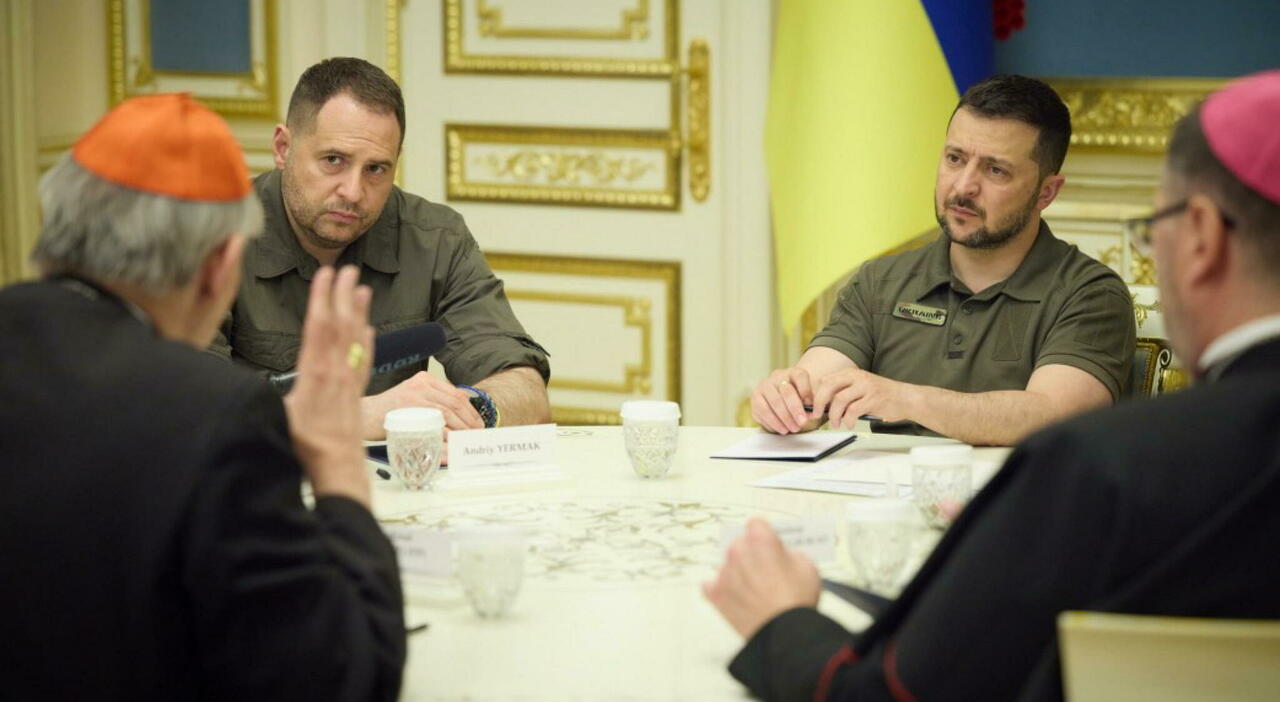Tuesday 12 March 2024, 09:43 - Last updated: 14 March, 09:32
In nearly eleven years of pontificate, it is not the first time that the Pope's diplomacy is forced to intervene to adjust the aim, recalibrating certain papal statements, explaining better - to the chancelleries - what his real intentions were. It happened when he called the Orthodox Patriarch Kirill a 'altar boy' of the Kremlin, when he accused NATO of 'barking' at the borders of Russia provoking it, when he prayed for the daughter of the ideologue Dugin (an ideologue of the extermination of Ukrainians herself), when he praised the cultural roots of the 'Great Mother Russia', when he thundered against Chechens and Buryats, causing the irritation of Khadirov. Thus, after the latest diplomatic mess over Ukraine and the supposed white flag that Kiev should raise to then go to the negotiating table with Russia, the official exegesis of the Vatican arrived. Yesterday morning the apostolic nuncio Vislvaldas Kulbokas - summoned by the Ukrainian foreign ministry, Kuleba to explain what the line from Beyond the Tiber was - and Cardinal Parolin moved. Kulbokas repeated that there is an aggressor and an aggressed and that nothing has changed. Something that publicly also did the cardinal who straightened the bar entrusting the meaning of that 'correction' to Corriere.it. 'The Pope's appeal is that conditions are created for a diplomatic solution in search of a just and lasting peace. In this sense, it is obvious that the creation of such conditions is not only up to one of the parties, but to both, and the first condition seems to me to be precisely that of putting an end to the aggression,' the cardinal let it be known. The question from the Swiss TV journalist to the Pope was this: 'In Ukraine, there are those who ask for the courage of surrender, of the white flag. But others say that this would legitimize the strongest. What do you think?' The Pope answered: 'It's an interpretation. But I believe that the strongest is the one who sees the situation, who thinks of the people, who has the courage of the white flag, to negotiate. And today it is possible to negotiate with the help of international powers. The word negotiate is a courageous word. When you see that you are defeated, that things are not going well, you need to have the courage to negotiate. You are ashamed, but how many deaths will it end with? Negotiate in time, look for some country that acts as a mediator. Today, for example in the war in Ukraine, there are many who want to mediate. Turkey, has offered itself for this. And others. Do not be ashamed to negotiate before it gets worse.' Despite the Vatican diplomatic intervention, Francesco's words continue to raise perplexity and malaise. Federal Chancellor Olaf Scholz (SPD) said he disagreed with the Pope on this issue, explained Monday government spokesman Steffen Hebestreit in Berlin. 'Ukraine is defending itself from an aggressor and is receiving a lot of international support for this, including from Germany.' Perplexity also from the governments of Lithuania and Poland and there are no objections even among the Ukrainian bishops. The bishop of Kharkiv and Zaporizhia, Pavlo Honczaruk, for example, defined the negotiations suggested by Francesco 'unacceptable' because Ukraine had very bad experiences with Russia: 'The Pope hopes that the aggressor has a human face. It's a mistake.' The bishop then pointed out that no Ukrainian is in favor of surrender. 'This is a lie.' In that interview, the bishop sees a manipulation: 'The Pope is a great supporter of Ukraine and some misunderstandings become a good tool for manipulative forces because of his spontaneity and naivety.' Ten months ago, pollsters had asked Ukrainians who were the religious leaders they trusted the most. Pope Francis was in fourth place with 3.1 percent, ahead of Ecumenical Patriarch Bartholomew I of Constantinople (1.8 percent) and Russian Orthodox Patriarch Kirill I (0.5 percent). The Greek Catholic Church and Bishop Sviatoslav Shevchuck is considered a point of reference. 'Ukrainians cannot surrender, because surrender means death. Putin's intentions and Russia's are clear and unequivocal.' Ukrainians must therefore continue to defend themselves. Talks with Moscow would make no sense: 'Recent history has shown that there will be no real negotiations with Putin.' Shevchuck has stressed several times that Ukraine gave up its nuclear missiles in negotiations 30 years ago behind security guarantees for its territorial integrity and independence. The Budapest Memorandum signed by Russia, the United States, and the United Kingdom in 1994. A paper that too often is forgotten. Even the Council of Churches and Pan-Ukrainian Religious Communities has chosen clear words. If Ukraine surrendered 'at the mercy of the enemy', this would have 'nothing to do with peace', but would mean the 'victory of slavery over freedom'. This body includes the 15 largest religious communities in the country. 'To capitulate to triumphant evil is equivalent to a collapse of the universal idea of justice; a betrayal of the fundamental guidelines that have been inherited in the great spiritual traditions.' The faithful are therefore blessed in the defense of their country and will continue to do so. They will also continue to pray 'for victory over the enemy and a just peace.'
© ALL RIGHTS RESERVED
This article is automatically translated
